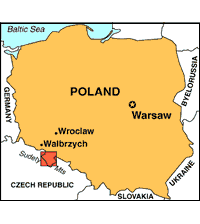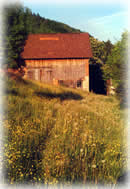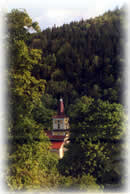 |
 |
||
 |
|||
| LOCAL THEMES agriculture culture and customs economics education environment environmental knowledge family life festivals forestry health history identity industry migration resettlement social relationships tourism water BACKGROUND OTHER LOCATIONS |
introducing the area
Currently the only collection on this website gathered in the North, these interviews show how the complex political history of Europe's last 80 years has had a profound impact on a relatively remote highland area. The slant on mountain development may be different to the other collections, but the sense of the urgent need to meet new challenges if a sustainable way of life is to be established is equally strong.
These new Polish settlers were quite unfamiliar with mountain terrain, and many found it threatening and alien. There were virtually no social ties between the settlers, and for nearly 50 years many existed in a state of limbo, believing their situation to be "temporary". Indeed, unlike many culturally rich and distinctive mountain groups, these settlers were not united by any commonly held tradition, folklore, songs or other forms of cultural expression. Interviews with different generations illustrate how, for some, a sense of identity with the location has only gradually developed. This collection also contains stories from some of the few Germans who stayed on in the Valley after 1946, having become "outsiders" in their old environment.
Indeed, there is a real sense that only now, in this new era of openness and looking to the future, would such a community history project be possible. Germans who had remained silent about their origins, for example, are now willing to open up. The result is over 40 varied, vivid and compelling personal accounts of change - social, political and environmental - which, being set in such a central part of Europe, tell a wider story of how major historical events affected individuals and their families. the themesWhile questions of identity, conflict, reconciliation and politics characterise this fascinating collection, there is also much material on the changing environment, and perceived shifts in patterns of weather, seasons, wildlife etc. During the communist era, local farmers were relatively well-off, but today agriculture has become barely sustainable economically and out-migration is accelerating. People's testimony and old photographs show that changes in agricultural practices and policies (and the polluting effect of unregulated industry during the communist era) has visibly affected the local environment, although this immediate area (Lower Silesia) escaped some of the pollution which ravaged Upper Silesia. Another topic is the impact of the massive flood in 1997, which caused widespread damage in the area, and loss of life. the partnersZdanie (the "Point of View" Association), a local NGO with a strong grassroots base, was a natural home for the project. There are 15 permanent members but more than 150 regular volunteers. Zdanie was founded 10 years ago by Krzysztof Komornicki, who coordinated the oral testimony project. The interviewing team were all female: four school students, four undergraduates studying journalism at Wroclaw University and one radio journalist from the regional programmes department of Radio Wroclaw. Interviews were gathered in the summer of 1999. The testimonies were collected from people who it was felt could talk eloquently about particular themes such as the environment, the flood, resettlement, migration or being an original inhabitant. The result is that individual testimonies sometimes focus on one or two topics in detail, whereas narrators in other collections on this site tend to cover a wider range of issues. In June 2000, Zdanie launched a publication Swiadectwa Ludzi Gór (Sudety), and an exhibition based on extracts from the testimonies with portraits of each narrator, together with photographs old and new of the surrounding environment. A series of weekly radio programmes based on the testimonies was created, and broadcast on Radio Wroclaw 1 (the biggest station in SW Poland) in December 2001 and January 2002. The series’ success in generating letters and phone calls from listeners prompted plans for another series with settlers of different nationalities in Wroclaw. In 2001 the collection was expanded, with a particular emphasis on the German narrators in the area and on the Czech side of the Sudety mountains. During IYM 2002, local coordinator Krzysztof Komornicki presented the project at several conferences and in 2003, Zdanie organised another exhibition in Amberg, with an accompanying booklet and set of postcards based on the new interviews and some from the first collection. Interview excerpts were in Czech, German and Polish, and two hundred copies of the booklet were disseminated among local people, parliamentarians, diplomats and Zdanie’s German and Czech partners. The interest generated by all these activities highlights the growing importance to those living “in the heart of Europe” of acknowledging the varied national histories and cultures which have shaped their physical and social environments. publications
|
|||||||||

 Klodzko Valley, in Sudety mountains, southwest Poland, was directly
effected by what has been called one of the greatest population
shifts in European history. Once part of Germany, the region was
within the Western territories "recovered" for Poland from Germany
after the Second World War (1939-45). The redrawn national boundaries
involved many Germans, such as those in the Klodzko Valley, being
expelled across the new Polish border to the west. In turn, Poles
from Poland's eastern provinces settled in the towns, villages and
farms vacated by the Germans. These Poles were "sent" there by the
Russian authorities from their own homelands in the Eastern territories
(now Ukraine and Byelorussia) which Russia in turn had "recovered"
from Poland. (In effect, Poland's post-war borders took a great
shift westwards.) Many of these narrators had been sent to Siberia
during the war, and there are powerful descriptions of camp survival,
as well as of pre-war rural life in the fertile but undeveloped
"flatlands" of the east.
Klodzko Valley, in Sudety mountains, southwest Poland, was directly
effected by what has been called one of the greatest population
shifts in European history. Once part of Germany, the region was
within the Western territories "recovered" for Poland from Germany
after the Second World War (1939-45). The redrawn national boundaries
involved many Germans, such as those in the Klodzko Valley, being
expelled across the new Polish border to the west. In turn, Poles
from Poland's eastern provinces settled in the towns, villages and
farms vacated by the Germans. These Poles were "sent" there by the
Russian authorities from their own homelands in the Eastern territories
(now Ukraine and Byelorussia) which Russia in turn had "recovered"
from Poland. (In effect, Poland's post-war borders took a great
shift westwards.) Many of these narrators had been sent to Siberia
during the war, and there are powerful descriptions of camp survival,
as well as of pre-war rural life in the fertile but undeveloped
"flatlands" of the east.  These
groups - the original German inhabitants and the Polish resettlers
- were joined by a final group of settlers, who identify themselves
as the intelligentsia déclassé. The waves of their retreat to remote
rural areas coincided with crucial moments in Poland's post-war
history: 1956, 1968, 1976, 1981 and 1989. Most were professionals
(writers, academics, journalists, politicians, scientists etc) who
left public life and urban environments because of disillusionment
with the political regime. Although all took up farming to survive,
since 1989 many have revived their old skills and interests, establishing
NGOs and becoming a "driving force" for change in the region.
These
groups - the original German inhabitants and the Polish resettlers
- were joined by a final group of settlers, who identify themselves
as the intelligentsia déclassé. The waves of their retreat to remote
rural areas coincided with crucial moments in Poland's post-war
history: 1956, 1968, 1976, 1981 and 1989. Most were professionals
(writers, academics, journalists, politicians, scientists etc) who
left public life and urban environments because of disillusionment
with the political regime. Although all took up farming to survive,
since 1989 many have revived their old skills and interests, establishing
NGOs and becoming a "driving force" for change in the region. 
